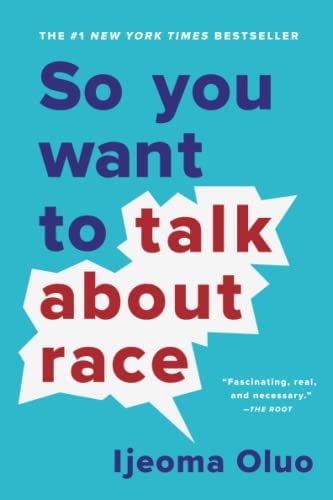
Author: Ijeoma Oluo
Topics: Race Relations, Intercultural Communication, Ethnic Studies, African American Studies, Political Freedom & Security, Civil Rights
Summary
“I started writing out of frustration,” Oluo begins with searing honesty, a tone woven throughout the book So You Want To Talk About Race. She continues, “Frustration that there could be so many words to discuss a single topic without actually getting to the core truths of it.” Oluo knowledgeably guides us toward discovering these core truths through a potent combination of recounting personal interactions and concisely defining concepts. She encourages readers to engage in conversations regarding race that will be difficult to navigate and that you will often get completely wrong. She emphasizes that it involves everyone, as race impacts almost every aspect of our lives. If we’re putting in actual work, Oluo acknowledges there will be missteps and failures, but there are ways to navigate them with respect, grace, and understanding. Each chapter ends with a trove of tips and guidance for navigating these moments in conversations about race in a way that will begin to heal and enact change instead of instilling more damage.
Masterfully structured, So You Want To Talk About Race sets readers up with a foundation of thought, “is it really about race?” (yes, it almost always is) and a definition of racism, “a prejudice against someone based on race, when systems of power reinforce those prejudices.” Once this frame of mind is in place, Oluo explores topics such as police brutality, the school-to-prison pipeline, the “n” word and its history of hurt and damage, and the use of microaggressions and tone policing in discourse. Unique topics such as “checking one’s privilege” are explored in new and insightful ways by studying privilege and its direct effect on systematic oppression and inequality. Another such topic, “cultural appropriation,” is also represented, using rap music as an accessible example to readers. Lastly, “Intersectionality” notes its direct impact on ensuring that certain people are not left behind in a more generalized push for equality.
Oluo encourages readers, “Do not fear the opportunity to do better,” ending her book with a list of “little pieces of the system you can dismantle.” These include voting locally, getting involved in the school system, supporting the businesses of POC, and bearing witness. “Radical oppression starts in our homes, our offices, our cities, and our states and it can end there as well. So start talking, not just about the problems but solutions. We can do this, together.”
You’ll Love This Book If
If you are searching for a brilliant and earnestly presented toolbox of skills to fight the systematic oppression millions of people of color face, this book was written for you and will be a powerful addition to your resource library.
Trigger Warning
If you are a person of color, this book may bring forward some trauma of experiences around race.
This book may not be for you if you’re looking for a deeper exploration into the treatment of and racism towards Asian Americans and the Indigenous population.
